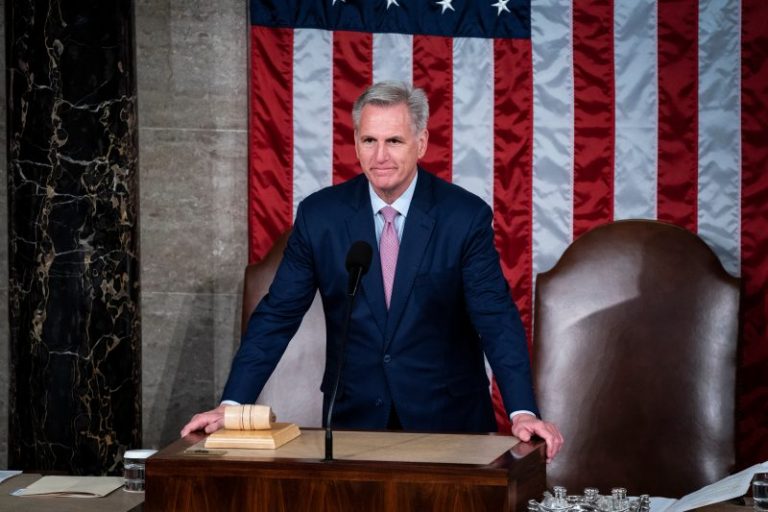House Speaker Kevin McCarthy (R-Calif.) on Thursday denied promising Donald Trump a vote on expunging the former president’s two impeachments — a legislative maneuver that some House Republicans argue would carry little legal weight and could jeopardize the standing of some moderate GOP caucus members.
Politico reported earlier Thursday that McCarthy promised Trump a vote before the August recess to remain in the former president’s favor after McCarthy suggested Trump might not be the best Republican nominee in the 2024 presidential race.
Hours after the report published, however, McCarthy told NBC News that he had made no such deal.
“There’s no deal, but I’ve been very clear, from long before, when I voted against impeachments that they did it for purely political purposes,” McCarthy told NBC. “I support expungement, but there’s no deal out there.”
Last month, Reps. Elise Stefanik (N.Y.), the Republican conference chair, and Marjorie Taylor Greene (R-Ga.) introduced resolutions to “expunge” Trump’s impeachment record, as if “such Articles of Impeachment never passed the full House of Representatives.” In statements announcing their resolutions, Stefanik and Greene accused Democrats of “weaponizing the power of impeachment” against Trump, a claim many of the president’s allies have made to defend him against efforts to investigate him and any potential wrongdoing.
House Majority Leader Rep. Steve Scalise (R-La.) said Thursday there is no timeline for when Stefanik and Greene’s expungement resolutions could be brought to a vote. The full Republican conference, he said, has not yet been brought into discussions on them.
“Obviously the bills are filed and we’ll see where the committee goes with it,” Scalise said. “We’re doing the appropriations bills next week. And then of course, when we return in September, we have a lot of other appropriations bills teed up. … So we’re going to be very busy.”
Multiple Republicans from swing districts approached McCarthy to implore him not to bring the expungement resolutions to the floor because it would put them in a politically perilous position, according to three people familiar with the conversations who were granted anonymity to discuss private talks. Freshman lawmakers, many of whom represent districts President Biden won in 2020, do not want to go on the record on a politically charged matter from the last Congress.
“The whole concept of looking backwards is ridiculous to most Americans. And what are we expunging? A public record that concluded in ‘not guilty,’” said one moderate House Republican, who was granted anonymity to speak candidly about how many in the conference feel. “This is an unnecessary vote meant to … feed an ego?”
Trump was impeached twice by the House, which then had a Democratic majority, during his four-year presidency. First in 2019, for withholding military aid from Ukraine in exchange for political favors, and in 2021, for inciting the Jan. 6 Capitol riot. He was acquitted in each of the Senate trials, but the impeachments by the House remain part of the historical record.
While McCarthy has long said he’s willing to take a look at expunging the impeachments — in January, he told reporters then that he “would understand why members would want to bring [expungement] forward” — some members of his caucus on Thursday questioned the purpose and practicality of making such a move.
Rep. Kelly Armstrong (R-N.D.), who voted against both of Trump’s impeachments, said he’d vote for an expungement if it came to the floor, but noted that expungements are for convictions.
“I have a hard time expunging something when there wasn’t a conviction,” Armstrong said.
Rep. Michael Lawler (R-N.Y.), a freshman lawmaker who was not in office during Trump’s impeachments, questioned whether there is anything to expunge.
“He was acquitted at trial, so I don’t really see the purpose in it,” Lawler said.
Still, legal and constitutional experts argue that expunging an impeachment is not something the Constitution allows.
Jonathan Turley, a constitutional law professor at George Washington University who was called on by Republicans to testify during Trump’s first impeachment, told The Washington Post that the Constitution has “no provision for expungement of an impeachment.”
“Impeachment is not like a constitutional DUI that can be expunged,” he said. “It became vested and settled with the majority vote on Jan. 13, 2021.”
Michael Gerhardt, a professor of jurisprudence at the University of North Carolina who also testified during Trump’s first impeachment, said that passing a resolution expunging the impeachments would have no practical effect other than appeasing Trump.
“Once the House impeaches somebody and the articles go to the Senate, the House loses its jurisdiction over that, it has no power whatsoever over that case again,” he said. “And so there’s no way legally for the House to retain jurisdiction over that matter — unless they impeach Trump [again].”
The arguments used in resolutions to expunge the impeachments, Gerhard argued, are based on a “complete misunderstanding of constitutional law.”
“And maybe that’s the point,” he said. “They’re not really doing constitutional law at all. They’re just making stuff up.”
Donald Sherman, the chief counsel and executive vice president at watchdog organization Citizens for Responsible Ethics in Washington, called conversations on expungement a “Faustian effort” that has “no legal or practical effect other than continuing to rewrite history in defense of Donald Trump’s corruption and insurrection.”
As she walked into McCarthy’s office on Thursday morning, Greene said there is no deal within the caucus to move on expunging Trump’s impeachments.
Leigh Ann Caldwell contributed to this report.
A previous version of this article described Rep. Steve Scalise as House Majority Whip. He is House Majority Leader. The article has been updated.

